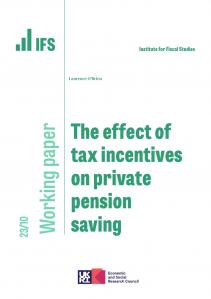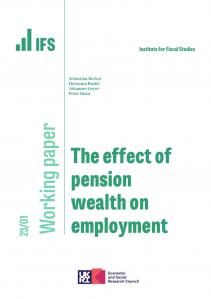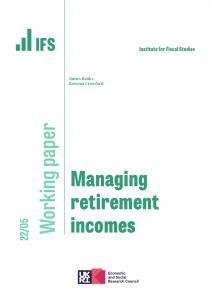The current generation of pensioners is doing better than any before it. But this success may be blinding us to the risk that future generations will not fare as well. A substantial new Pensions Review will assess future risks and determine what needs to be done to secure decent retirement outcomes for current working-age generations.
For the first time in history, since 2009 the average income of pensioners has been similar to that for those under state pension age. Pensioner poverty rates are lower than the population average. And more employees are saving into workplace pensions than ever before. These are all big policy successes.
But a new report published today by IFS, launching the Pensions Review in partnership with the abrdn Financial Fairness Trust, finds that the future looks risky at best for many current workers hoping for a comfortable retirement.
The last twenty years have seen the continued decline of defined benefit (salary-linked) pensions in the private sector, the abolition of state earnings-related pensions, low interest rates, falling homeownership, low typical contributions to defined contribution schemes, and a collapse in pension saving among the self-employed. The introduction of pension freedoms has given people flexibility but means there is no longer the same degree of longevity-risk-sharing that defined benefit pensions and annuities provide. Individuals, rather than employers or insurance firms, now bear the burden of the risk of poor investment performance and uncertain lifespan.
We therefore need a major review of pension provision now in order to give us a chance of avoiding a future that looks much worse than the present.
Specific reasons for concern include:
- Many employees are saving very little for retirement: 60% of middle-earning private sector employees who are contributing to a pension are saving less than 8% of their earnings. Nearly 90% of them are saving less than the roughly 15% of earnings that Lord Turner’s Pensions Commission thought more appropriate. Almost all of this saving is coming in the form of defined contribution pensions, which leave individuals – rather than their employers – exposed to risks that may be difficult to manage well.
- Fewer than one-in-five of the growing number of self-employed workers are saving in a pension. This compares with around a third when the Pensions Commission reported. This is particularly concerning given that the decline in pension membership among the self-employed is greatest among those who have been self-employed for a long period.
- Increasing numbers approaching retirement live in more expensive, insecure, private rented accommodation. At age 65, only 3–4% of those born in the 1930s and 1940s lived in private rented housing, compared with 6% for those born in the 1950s and with what looks likely to be 10% for those born in the 1960s. Unless a wave of inheritances leads to rising homeownership, this percentage could be even higher for younger generations, leading to a combination of a disappointingly low standard of living in retirement and/or greater reliance on housing benefit.
- Higher state pension ages are a coherent response to the challenges of increased longevity at older ages, but they pose difficulties for many and longevity improvements have not been as big as predicted a decade ago. The higher state pension ages rise, the harder it will be for people to remain in paid work until that age. Among those with low levels of formal education, 43% of men and 46% of women in their late 60s are disabled. A higher state pension age pushes up income poverty rates of those in their 60s: the latest increase, from 65 to 66, led to the income poverty rate of 65-year-olds more than doubling.
- The demographic and other pressures on the public finances are already considerable. 24% of adults are currently over the state pension age. This is projected to rise to 27% by 2050 and 30% by 2070. This puts substantial pressure on public finances. The Office for Budget Responsibility projects state pension and pensioner benefit spending to rise from 5.6% to 9.6% of national income by the early 2070s; this increase is equivalent to £100 billion a year in today’s terms. The pressures facing the public finances due to health spending are even larger.
- Those retiring with defined contribution pension pots face considerable difficulty and risk in managing their finances through retirement. There are risks of running out of private resources or of being so cautious that people have a needlessly austere retirement. While pension freedoms do give people the opportunity to take control of their own finances, even for the most numerate the decisions on how to draw their pension wealth – which need to be made right through retirement – are difficult.
To address these challenges facing future generations of pensioners, IFS is leading a new multi- year Pensions Review, in partnership with the abrdn Financial Fairness Trust. It will examine the effects of changing economic conditions and public policies on the future of financial security in retirement, including how these effects differ by gender, ethnicity and across the UK. The Review is being launched at an event on 20 April where a keynote speech will be given by Lord Turner, who led the Pensions Commission twenty years ago.
Led by three Directors at IFS – Jonathan Cribb, Carl Emmerson and Paul Johnson – the Pensions Review will produce a series of detailed reports over the next two years on the challenges facing future generations of pensioners, with its main phase concluding in Summer 2025 when we will provide concrete policy recommendations and options for reform.
We are delighted to benefit from the strategic advice of a steering group composed of Alistair Darling (former Chancellor of the Exchequer), David Gauke (former Secretary of State for Work and Pensions) and Joanne Segars (former Chief Executive of the Pensions and Lifetime Savings Association).
Paul Johnson, Director of IFS, said:
‘The last decade or so has seen state and private pensions deliver much better outcomes for many pensioners. But there is a risk this has bred complacency among policymakers. Automatic enrolment has brought millions into workplace pensions, but all too often at much lower rates of saving than the Pensions Commission thought would be needed. Despite the number of self-employed people growing considerably, many fewer of them are saving in a pension. Most private sector workers are left having to manage considerable risks – not least over how long their retirement will be – which for many will be incredibly difficult to balance well. And an increasing number are likely to spend their retirement in relatively expensive, and less secure, private rented accommodation which will have adverse consequences for both retirement living standards and the government’s housing benefit bill. A fresh look at the UK retirement saving environment is long overdue.’
Alistair Darling, Pensions Review steering group member and chair of abrdn Financial Fairness Trust, said:
‘Twenty years ago we set up the Pensions Commission which laid out a range of important reforms including auto enrolment. But today much has changed and the landscape is very different. Too many are saving too little for retirement. Many self-employed and those in insecure work don’t have a pension. Increasing numbers are living in the private rented sector, which will lead to higher housing costs in later life. Whilst today, many pensioners are doing well on average and pensioner poverty has been cut drastically, we need a major review to avoid a future where too many won’t have enough to live on in their old age.’












